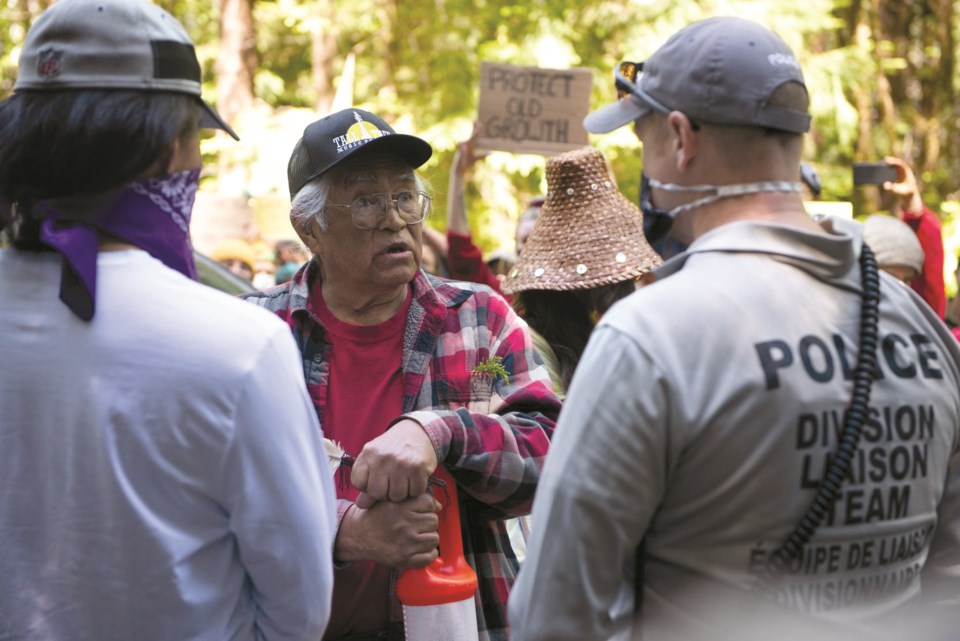In the two weeks since my last column took aim at the hubris, conceit and Luddite sensibilities of B.C.’s anachronistic “forestry” practices—specifically as these relate to the biologically and morally indefensible logging of its remaining 2.6 per cent of truly ancient old-growth—a lot has transpired: hundreds more land defenders were arrested by the hyperactive and impressively over-resourced RCMP at the Fairy Creek blockades; mainstream media finally tuned in; enviro-lame-duck Premier John Horgan tabled an obtuse and bizarre “policy intention paper,” then bowed further to public pressure in the guise of a First Nations request to defer logging in the contested watersheds for two years (basically until the goals of his intention paper drop in 2023), and our own Cheakamus Community Forest read the writing on the public-relations wall and deferred its dubious planned logging of Whistler-area old growth for a year.
On the face of it, these events seem cumulatively positive. But of course, “seem” is the operative word when it comes to the environment—doubly so when this also involves “deferral.” So, let’s a take a closer look.
I’ll start with the arrests. Is it just me or does the RCMP seem oriented and outfitted not to fight crime in crime’s true haunts (like, for example, boardrooms), but to quell legitimate citizen uprisings? And I’m not even talking about the bulletproof vests apparently necessary to dislodge hippies (as they’d have us believe defenders to be) from objects they’ve chained themselves to, but the array of weaponry, training, manpower and expensive hardware like helicopters that sees them long-line into tree-perches to haul up even more defenders. That the RCMP goes to absolutely any length to ensnare pacifist protestors but barely notes criminal activity enacted daily by resource-extraction companies is truly eyebrow-raising. Think about this any way you want, but it adds up to your tax dollars being used to harass and incarcerate citizen heroes standing up for the environment (and thus, you) while protecting the greed-riddled, regulation-skirting criminal machinations of industry (https://thenarwhal.ca).
Back in the day it was easy to make national news with an “exotic” West Coast logging controversy. These days, with Canada’s mainstream media largely controlled by conservative individuals or companies, protests must directly threaten economic orthodoxy to make headlines. Apparently, they have. Perhaps it was also the viral video of a First Nations protestor abused and arrested, or Tzeporah Berman’s déjà vu frontline sojourn (https://www.theglobeandmail.com), but the sad plight of B.C.’s old-growth ghosts has rattled the national consciousness again and, in so doing, garnered attention from American and European media (which, as we all know, is when chickenshit Canadian governments like B.C.’s NDP finally pretend to care).
Speaking of which, what to make of Horgan’s underwhelming policy intention indicating little more than his government’s malign intention to continue treating forests as crops and not ecosystems? As explained in a Narwhal.ca analysis, the hollow plan sets the stage for more old-growth conflicts by: 1) inexplicably overlooking old-growth logging deferrals; 2) not plotting a new funding path to a more sustainable “forestry industry” (there’s no such thing, BTW, only an “ecosystem removal and modification industry”); 3) doubling forest tenures for First Nations to 20 per cent of the provincial total, both insulting and wholly inadequate in leaving 80 per cent under industry control and facing First Nations with the insidious dichotomy of not cutting old growth and having no money, or cutting old growth and having money—though a pathetic fraction (e.g., in the Fairy Creek case it’s $20 million for Teal-Jones vs. a few hundred K for the Pacheedaht—which Horgan lauds as reconciliation); 4) maximizing value and supporting local manufacturers, which, though right-minded won’t shift industry control from large companies, and 5) not even remotely addressing B.C.’s failing report card on biodiversity (B.C. Biodiversity report). In summary, the term “managed forests” is a candy-coated euphemism for forests that are mismanaged to a greater or lesser degree (and don’t get me started on the profligate cable-and-hook garbage that industry leaves behind in the woods). As a recent Tyee.ca article states, “Let’s call Premier John Horgan’s forest policies what they are—a colonial defence of talk and log and a moral failure to protect the province’s remaining old growth forests.”
Now to those deferrals. Far from noble deference to concerned parties, resource-industry deferrals are mostly de facto acts of cowardice designed to take the spotlight off those perpetrating whatever malfeasance is being questioned. The same kick-the-can-down-the-roadism as distant target dates for implementation of environmental policies like salmon-farm removal, species-at-risk legislation, orphan well clean-up or emissions reductions. In fact, given the urgency of issues which they’re generally meant to address, deferrals are little more than digestible nonsense wrapped around bitter irresponsibility. And no, Mark Twain didn’t say that. I did because it’s what I’ve seen again and again in a half-century living in Canada. The intention isn’t to actually address a known problem with a known solution as scientists might, rather to wait out the tide of public opinion so an activity can resume with a lipstick engagement process—“engagement” being the latest insidious way of manufacturing consent.
The real solution, again, is obvious: institute a much overdue, scientifically supported moratorium on old-growth logging and compensate those who will be put out. Until such times, the blockades should remain. It’s far too late for half-measures and time to fully transition B.C.’s wood-product industry to the second- and third-growth on which it has carelessly staked its future.
Leslie Anthony is a scientist and author who enjoys connecting the dots to reverse political and media spin.




